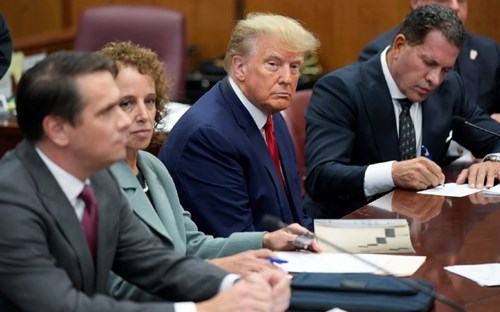After the verdict last week, May 30, Trump and his attorneys publicly said the conviction will be appealed in hopes of overturning it. Under New York law, however, any appeal will have to wait until July 11, the date of Trump’s sentencing that is now five weeks away.
One question asked by some is if Trump can appeal the verdict to the U.S. Supreme Court, which could mean a quick end to the legal drama that otherwise could drag out for months into the November election.
Christian Adams, a former DOJ attorney who now leads the Public Interest Legal Foundation, says that is an unlikely path due to New York’s legal channels.
 “There's no federal ‘frontage road option’ to deal with this,” he tells AFN. “It's a standard criminal case that has to go through this standard procedure."
“There's no federal ‘frontage road option’ to deal with this,” he tells AFN. “It's a standard criminal case that has to go through this standard procedure."
A related story by Politico, published June 3, said Trump’s first post-sentencing stop is a New York appellate court. The court is nicknamed the “13th juror” for its frequent review of jury convictions.
In an honest review of the trial, legal experts told Politico that Trump’s attorneys have several issues on which to build an appeal, beginning with how 34 misdemeanor counts for falsifying business records became a felony case.
Other legal issues Trump can argue before the appellate court are Judge Juan Merchan limiting the testimony of Bradley Smith, a former FEC chairman, but allowing Stormy Daniels to give salacious, tabloid-like testimony about her sexual relationship with Trump.
Trump’s attorneys ultimately decided not to call Smith to the stand due to Judge Merchan’s rulings to limit what he could discuss as a defense witness.

Other potential issues are Judge Merchan refusing to recuse himself despite donating to Joe Biden, and his daughter’s political firm, and for refusing to move the trial out of Manhattan despite the jury pool being almost all Democrats.
Asked if Judge Merchan and District Attorney Alvin Bragg will be held accountable for the unfair trial, Adams says the public will watch quite the opposite happen now that Trump is a convicted felon.
“They are only actually going to be more popular where they run for office because of this,” Adams predicts. “It's the opposite of being held accountable. They're going to be elevated. They're going to be rewarded for this."







